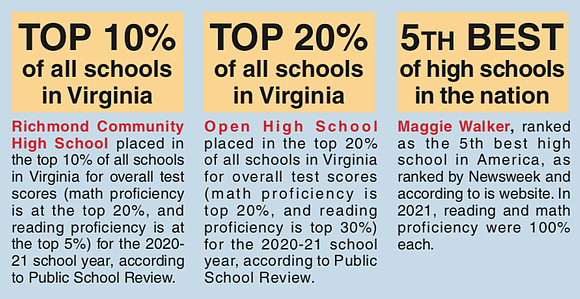RPS approves changes in selection process for three high schools
George Copeland Jr. | 9/21/2023, 6 p.m.
In an effort to enable more underprivileged students to attend Maggie L. Walker Governor’s School, Richmond Community High School and Open High, the Richmond School Board approved changes for admissions to those schools on Monday.
The vote was seven-to-one vote, with board member Shonda Harris-Muhammed abstaining.
Under the new policy, the three highest-scoring students from all eight Richmond middle schools and three highest-scoring applicants from private and home schools who apply for a specialty school will be offered a seat at those highly regarded schools.
Subsequent offers will go to the next highest-scoring students who are economically disadvantaged, until the total amount of offers account for 50 percent of the seats at each school. The remaining seats will go to the next highest-scoring students that apply.
The approved proposal was the third of three optional proposals presented to the Board, and combined aspects of the other two options.
Children from homes with low-incomes tend to “start the race several yards behind the starting line,” Superintendent Jason Kamras said in presenting the proposed change during the school board’s Monday night meeting. “The recommendation I put forth regarding specialty schools attempts to make the race a bit fairer.
“It does so by giving a small boost to the very talented low-income students who’ve been working themselves to the bone to win the race, despite starting well behind their higher-income peers.”
The vote ended weeks of heated discussion among education officials and the RPS community about the selection process for the city’s three top-ranked high schools.
Academic standards, test scores and graduation rates at the Maggie L. Walker Governor’s School, Richmond Community High School and Open High routinely surpass other Richmond high schools.
However, those disparities sparked concerns about who benefits most from such schools. An investigation by the Equity Commission on Enrollment found stark contrasts between admissions for under-privileged students and families.
“As a whole, RPS specialty schools and the Governor’s schools do not reflect RPS’s enrollment, largely because of inequitable admissions processes,” the Equity Commission on Enrollment said in its final report. “In some cases, these specialty and Governor’s schools grossly underserve Economically Disadvantaged students, Black students, English Language Learners and students with Individualized Education Plans.”
While board members were in favor of ensuring more students could receive a quality education, not all agreed with the options presented. School Board member Jonathan Young voted against the proposal, saying it discriminates against students who lived in certain zip codes or have a higher family income.
As he did with last week’s board meeting, Mr. Young proposed a fourth option that would expand seats at all specialty schools for another 40 plus students. He also proposed the reconstitution of an RPS middle school into a specialty school, and a regional middle school built in collaboration with surrounding counties to give RPS students more resources to prepare students for specialty schools. A motion to amend the policy to this proposal failed two to seven.
Ms. Harris-Muhammed also expressed concern with whether the RPS community had meaningful input on the policy’s development, as well as the cap on private education students’applications that would be part of the admissions change.
Nearly two dozen parents, education officials and residents offered support or opposition to the admissions change during the nearly hourlong public comment period at the start of the meeting.
Those opposed echoed some of Mr. Young’s sentiments on how the change would disadvantage certain students, while adding other criticisms of the board’s focus on admissions over other school issues and questioning its legality.
“This will disenfranchise the middle class more. When the middle class is disenfranchised, they will not want to pay taxes to support something they will not be allowed to attend,” said Richmond resident Charles Frankenhoff. “This is an attack on middle-class taxpayers in the city of Richmond, and it is almost certainly unconstitutional.”
Supporters of the policy believe the admission change is long overdue and necessary to expand opportunities for education and properly reflect the missions and goals of the specialty schools, particularly Maggie L. Walker.
“You may hear tonight from speakers who feel that the new proposal is unfair,” said Adria Scharf, a parent of a junior student at Maggie Walker. “In my view, the real unfairness is the decades-long exclusion of gifted, intellectually curious, economically disadvantaged students from access to such an exceptional learning environment.”








